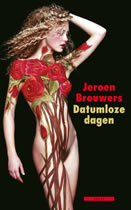Jeroen Brouwers
Numberless Days (Datumloze dagen)
Father and son
Datumloze dagen (Numberless Days), Jeroen Brouwers’ latest novel, incorporates a thunderous symphony of death. In his rich oeuvre this virtuoso author has consistently given voice to melancholy. Death plays a central role in all his novels, as well as in many of his essays.
Datumloze dagen is a short, dark novel about a father and a son, told retrospectively by the father in one long, strangling monologue: ‘A hateful memory suddenly slips into your brain, like a burglar throwing a piano wire over your head and tightening it round your throat.’ The nameless father got married young, and almost immediately realized that marriage was not for him. ‘I had the feeling that my life had become void of dates and that it would remain this way, the feeling that time was rushing blankly past me and I was leading a non-existence.’
His wife Mirjam wanted to save the ‘festering’ marriage by having a baby. Her husband resisted, lying next to her in bed like ‘a rigid mummy in a sarcophagus’, but she managed to seduce him during a stay in Venice — ‘sun, stand still!’ — a city that traditionally symbolises death. Brouwers’ narrative, heavy with foreboding like all his books, is jam-packed with symbolism and references to classical myths and literature. Every word and letter has a double meaning. Nathan (meaning ‘gift of God’) is born against his father’s explicit wishes.
His parents’ marriage runs aground soon after due to his father’s urge to cheat on his wife. For years the father doesn’t see his son, and almost forgets that he exists. Years later two seemingly coincidental, awkward meetings take place. ‘What is worse than not having a father? Having one.’ Shamefully the father doesn’t recognize his son, and consequently the son no longer wants to know the father. This changes when Nathan comes down with a mysterious, lethal blood disease, haemophagocytosis.
The father returns to the hospital, to Nathan’s sickbed, where the approach of death unites father and son in a horrifying climax. Exactly because the father has been a bastard, a selfish lecher, because of the bitter shame that finally overwhelms him, and because of the author’s honest, uncompromising, almost crushing description of his acts and thoughts, the poignancy and sadness of the final pages crash over the reader like a wave. A deeply melancholic, honest, and masterful novel.
Publisher
Atlas
Herengracht 481
NL - 1017 BT Amsterdam
TEL. +31 20 524 98 00
FAX +31 20 627 68 51
E-mail: [email protected]
Website: www.uitgeverijatlas.nl
Publishing details
Datumloze dagen (2007, 190 pp)

Biography
Jeroen Brouwers (b. 1940) grew up in Indonesia, worked as an editor at Manteau publishers in Brussels for twelve years and subsequently settled in the Netherlands. His debut, the story collection Het mes op de keel (The Knife to the Throat, 1964), and the novel Joris Ockeloen en het wachten (Joris Ockeloen and the Waiting, 1967) went scarcely noticed in the Dutch literary world. That ended in 1973 with the publication of the novella Zonder trommels en trompetten (Without Fanfare) in which Brouwers weaves his thematic web on death, love, loss and the past that is to inform his later work, such as the novel Zonsopgangen boven zee (Sunrises at Sea, 1977), which was a great critical success. Brouwers’s work has strong autobiographical elements, such as in the sketches Groetjes uit Brussel (Greetings from Brussels, 1969), in the polemical novel Het verzonkene (The Submerged, 1979, awarded with the Multatuli Prize) and in Bezonken rood (Sunken Red, 1981). He has written caustic and witty polemic tracts against literary currents or authors whose integrity he calls into question. De laatste deur (The Final Door, 1983), essays on suicides in Dutch-language literature, was reprinted three times within a year. Alongside his other essay and letter collections of 1976-1986, entitled Kroniek van een karakter I & II (Chronicle of a Character I & II, 1986-87), the novels Winterlicht (Winter Light, 1984), De Zondvloed (The Deluge, 1988, awarded with the F. Bordewijk Prize) and Zomervlucht (Summer Flight, 1990) appeared. In the decade to follow he published a number of essay collections and his own literary journal, Feuilletons. His novel Geheime kamers (Secret Rooms, 2000) was unexpected but became a resounding success: it met with unanimous praise and won the Flemish Golden Owl Award, the AKO Literature Prize 2001 and the Multatuli Prize. In 2007 Brouwers was awarded the prestigious three-yearly Dutch Literature Prize (Prijs der Nederlandse Letteren) for his entire oeuvre.
Website: www.jeroenbrouwers.be
Quotes
This novel is a poignant book about guilt and mourning and the impotent triumph of art.
Het Parool
Jeroen Brouwers pulls no punches in Numberless Days, about a man who gets a son whom he doesn’t want only to lose him again.
Knack
A real Brouwers: stylistically pure, beautifully composed, poignant, filled with melancholy and regret. […] Jeroen Brouwers creates a perfect fictional universe.
Elsevier
